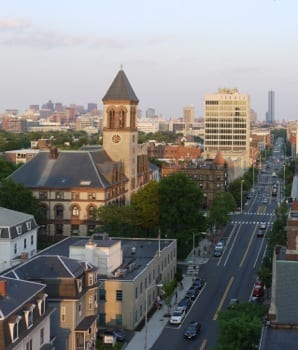Who is a member?
Our members are the local governments of Massachusetts and their elected and appointed leadership.
Mass Innovations, From The Beacon, June 2016
 The city of Cambridge sought a way to measure its performance in some areas of municipal work that aren’t always the easiest to measure. The city ended up with the highest score ever calculated by the STAR Community Rating System.
The city of Cambridge sought a way to measure its performance in some areas of municipal work that aren’t always the easiest to measure. The city ended up with the highest score ever calculated by the STAR Community Rating System.
Cambridge this spring achieved a 5-STAR rating from the Washington, D.C.-based nonprofit, which developed the system to help cities and towns evaluate their progress toward environmental, economic and social sustainability.
The STAR system matched up well with Cambridge’s desire to find a new way to holistically evaluate its efforts across different city departments and to establish a baseline that will allow officials to gauge progress in achieving the goals of its comprehensive plan. Iram Farooq, assistant city manager for community development, added that STAR’s sustainability principles also aligned with the theme for much of the city’s work and its comprehensive plan.
Farooq acknowledged that the city’s strong economic base allows it to provide high-quality services. The economic base is fueled by providing a pathway to economic success for Cambridge residents, from jobs to housing. The social piece of the equation supports economic mobility as well as youths, the elderly and others who cannot afford services on their own. Finally, strong local social and economic networks support resiliency for people in the face of climate change.
“It’s really hard to separate out the pieces,” Farooq said. “That’s something we’ve learned in our work and we’ve taken that approach … since our first comprehensive plan, in the early 1990s. That’s a philosophy we’ve had in Cambridge for a long time, and STAR is a good match for that, because it gives us the framework to analyze the pieces that we knew were connected and worked together.”
It isn’t always easy to measure the impact that various city programs, services and initiatives can have on those different pieces, Farooq said.
“Things that are easy to measure get measured and other things don’t,” she said. “We can measure trips on streets, and we’ve done that for decades, but things like how our parks impact people is not something that is easy to measure and so it’s something we haven’t historically done.”
The STAR system offered Cambridge a way to show how it stacks up against other cities in the country in tackling issues ranging from poverty and educational opportunity to active living and air quality.
The system scores communities on 44 objectives across seven areas: built environment; climate and energy; economy and jobs; education, arts and community; equity and empowerment; health and safety; and natural systems. Communities also earn credit for innovation.
Northampton was the first community to earn a 5-STAR rating from the nonprofit and is the only other community in Massachusetts to earn the rating. The other 5-STAR rated cities in the country are Seattle and Baltimore.
A number of programs and policies helped Cambridge earn STAR’s highest-ever score and surpass the already high standard set by Northampton, Seattle and Baltimore.
One is Cambridge’s Community Engagement Team, a multi-agency collaborative based in the human services department. The team helps the city connect with and support hard-to-reach communities, such as minorities, residents with linguistic barriers and recent immigrants, according to Cliff Cook, the city’s planning information manager.
The city also earned innovation points for its participatory budgeting process, which allows residents to choose how to spend $600,000 through an open vote. Associate Planner Robert Keller also pointed to the city’s youth engagement programs, which focus on supporting children not only through high school but through college as well. The program is designed to help students overcome cultural and financial barriers to collegiate success.
“We have programs in place to not only help people get to the college stage, but keep them there,” Keller said.
Cook said that many of the STAR metrics may be translatable to the city’s annual budget process, such as transportation metrics, affordable housing inventory, the success rate of the city’s preservation efforts, and the amount of water that can be safely generated by the city’s water system.
The STAR rating system will also support the city as it kicks off a new comprehensive planning process called Envision Cambridge.
“Having that baseline understanding really helps us build upon that when we go into the planning process,” Farooq said. “Historically, in many planning processes – even good and robust ones – they are not always data driven. It allows us to have a better back up for what we’re talking about. That’s going to really enrich the planning.”
For more information, contact Assistant City Manager for Community Development Iram Farooq at (617) 349-4600 or ifarooq@cambridgema.gov.